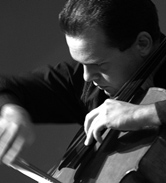The idea to launch a programme for cello(s) and tape reflects the taste of cellist Mindaugas Bačkus, 33, an excellent musician of a non-academic mind-set who bravely tests unusual colours and puzzles out complex musical ideas. The project was first presented by Mindaugas Backus in the framework of the electronic and electroacoustic music festival Jauna muzika. A subsequent CD "El Cello" (released in 2005) represents a multifarious soundscape of Lithuanian music for cello(s) and tape, expanded by the Inner World, a work by the popular Australian composer Carl Vine. Three of the six recorded pieces were written at the request of Mindaugas Bačkus and are dedicated to the performer.
|

photo: Mikhail Rashkovsky
|
After graduating from the Lithuanian Academy of Music and Theatre (under Prof. Rimantas Armonas), Mindaugas Bačkus continued his studies at the Royal Northern College of Music in Manchester under Prof. Ralph Kirschbaum and Prof. Karine Georgian. Mindaugas Bačkus has not felt fulfilled only by the secure cello leader's role with the Lithuanian State Symphony Orchestra (1998-2005). The cellist has been constantly giving solo performances and collaborating with chamber ensembles, and since 2002, he has been playing with the Chordos Quartet focused mostly on contemporary repertoire.
The project is exceptionally rich in musical and extramusical ideas. On the one hand, it features a tonal piece by Carl Vine,
Inner World (1994), that in Bačkus' interpretation breaths with rock-like expression. On the other hand, the CD includes
Terra tecta (2004) by
Vytautas V. Jurgutis, one of the leaders of Lithuanian experimental electronic music: its sophisticated electronic sound, complemented by the pointillistic cello fabric, should first of all appeal to the fans of avant-garde (or 'neo-garde'). There is also a third stylistic group - pieces that are related to a performance art or happening-like experience.
Al-Samoud (2003) by
Gintaras Sodeika and the
Prayer of the Faithful Word (2004) by
Algirdas Martinaitis are, into the bargain, also manifestations of a public stance of sorts.
In
Al-Samoud (referring to the Iraqi liquid-fuel missile), the electronic sound evokes a militaristic and mystical, to a degree, landscape of Iraq war; the sounds of cello interweave with the sounds of Theremin and the 'rambling' of percussion. The piece culminates by the musicians reading the Bible to a recorded background recitation of the Qur'an, as if manifesting the message of the piece: "the world is shrinking, and our responsibility is growing" (Gintaras Sodeika).
The
Prayer of the Faithful Word by Martinaitis is rooted intrinsically in Lithuanian public and cultural reality. The work is based on the original recording of the charismatic Lithuanian poet Sigitas Geda, reciting, shrieking and barking his
Prayer of the Faithful Word at the St. Johns' Church in Vilnius during the Poetry Spring' 91 - within several months after the tragic January events when the Soviet tanks attempted a military coup in Lithuania. According to the composer, "the poet's voice, convulsing as if in act of 'exorcism', shapes the entire musical fabric that, in its own turn, follows the syllabic structure of the literary text."
Martinaitis' next piece,
Birds of Eden (1981), represents the classics of Lithuanian neo-romanticism. Another island of tonality on the CD is
Strindberg's Dream, a piece by Giedrius Puskunigis, called the 'contemporary Tchaikovsky' in Lithuania.
Overall, the "El Cello" is an ingeniously diverse and in-depth project, a resource for everyone aspiring to know Lithuanian music and culture in general.
© Beata Baublinskienė
Lithuanian Music Link No. 12
MINDAUGAS BAČKUS / EL CELLO
Carl Vine. Inner World for cello and tape 13'
Gintaras Sodeika. Al-Samoud for cello, percussion and tape 24'
Algirdas Martinaitis. Birds of Eden for cello and tape 8'
Algirdas Martinaitis. Prayer of the Faithful Word for cello and tape 12'
Vytautas V. Jurgutis. Terra tecta for cello and tape 11'
Giedrius Puskunigis. Strindberg's Dream for cello and tape 5'

